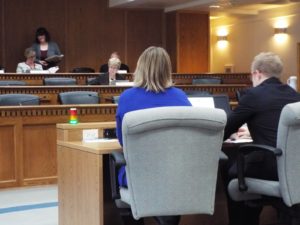As far as Jeanette Laffoon knew, her bill was dead. After a promising start in 2017, the state House of Representatives, House Bill 1239 went to the state Senate where it failed to make it further than the committee level. “I was so excited and then it died in committee and I was devastated,” says Laffoon, a lawyer who represents clients with disabilities. “But I didn’t know that when you submit a bill, there’s actually a two-year period and it can come back to life.” She was surprised when friends began calling to let her know they were seeing references to her bill on the legislative agenda.

The news caused rejoicing among advocates for the disabled. Laffoon initially introduced the legislation out of frustration with a system that seemed designed to make the process of acquiring medical records – a necessary step in gaining access to Social Security funds – as costly and cumbersome as possible. “Washington has the highest medical rate fee in the country,” says Kate Baber of the Washington Low Income Housing Alliance (WLIHA). “For people on extremely low incomes, that’s the biggest barrier to gathering the documents they need.”
Many of Laffoon’s clients at Maddox and Laffoon Attorneys at Law, which she operates with partner Steve Maddox, live on fixed incomes of as little as $197 per month. When confronted with a $26 fee plus a $1.18 per page cost for medical records, which sometimes numberer in the hundreds of pages, some would simply give up, resulting in grounds to dismiss their claim and increasing their risk of becoming homeless. HB 1239 will provide applicants with one free copy of their medical records that they can submit at their disability claims hearing.

When Representative Pat Sullivan first introduced the bill in 2017, it moved smoothly through the House committee and passed on the House floor by a vote of 90-6, before getting stuck in the Senate committee. After the latest election cycle, it was returned to the House floor, where it passed 91-5. This year, the Senate Committee on Health & Long Term Care passed the bill after public comment, but a new challenge followed. “The next step is that it goes to the Rules Committee and it could just stay there forever,” says Laffoon. “It was coming up to the last week of the session and it was still sitting in the Rules Committee. Somebody had to pull it.”
Fortunately, someone did. Laffoon credits the staff of State Representative Pat Sullivan with getting the bill out of the Rules Committee and onto the Senate floor. The Senate passed the bill by a vote of 40-9, and into the hands of Governor Inslee. The day he signed it into law, she was sitting at home with a severe cold. “I was sick as a dog when my staff called me,” she says. “They said, ‘Today’s the day. Can you come in?’”
The law will go into effect on June 7 and when it does, the impact will be significant, according to Jamie Olivares. “It’s huge,” says Olivares, an attorney at Halpern Olivares PLLC, a firm that specializes in cases involving Social Security and veterans. “The typical bill for medical records is between $300 and $500, sometimes approaching $1,000 if they have to go to an appellate court.”

Although attorneys can obtain records for clients, until now they’ve needed to be reimbursed. “Now our clients won’t have this bill from their lawyers at the end of the month,” says Olivares. “They’ve usually been without income for several years, and it’s a financial hardship. This helps to overcome that barrier.”
Those who will benefit the most, however, are disabled people who lack representation and need to seek records on their own. “When it comes time for their disability hearing, they’ll want to go to the doctors and hospitals they’ve been to and ask them for a copy of their medical records,” says Laffoon. “The disabled person only has to update the list from the last evidence that’s in the file up through the current time period.”
Two caveats: the medical community may not be aware of the change in the law and therefore might still attempt to charge for records. “They’re going to need to be educated as we go along,” says Laffoon. Also, due to a switch in Social Security protocols, claimants must now provide medical evidence at least five business days prior to their hearing.

Most importantly, applicants can only get one free copy in a two-year period. “You don’t want to go in and ask your doctor for a copy every time you get treatment because they won’t give them to you for free after a while,” Laffoon warns. Gathering one set of records prior to a hearing makes it more likely that a claim will succeed.
“This will make it easier for people to provide the medical evidence necessary,” says Laffoon. “Just saying you can’t work because you’re disabled is a lot different than showing the judge the MRI that shows your back is broken. I understand why it’s necessary to have that evidence. I was just furious because it was so difficult to get it.”
Today, however, it’s time for celebration, says Olivares. “This bill has removed a huge financial burden. It’s been a long time coming and we’re very happy that it passed.”
For more information, visit the Maddox & Laffoon website. To learn more about HB 1239, click here.




















































